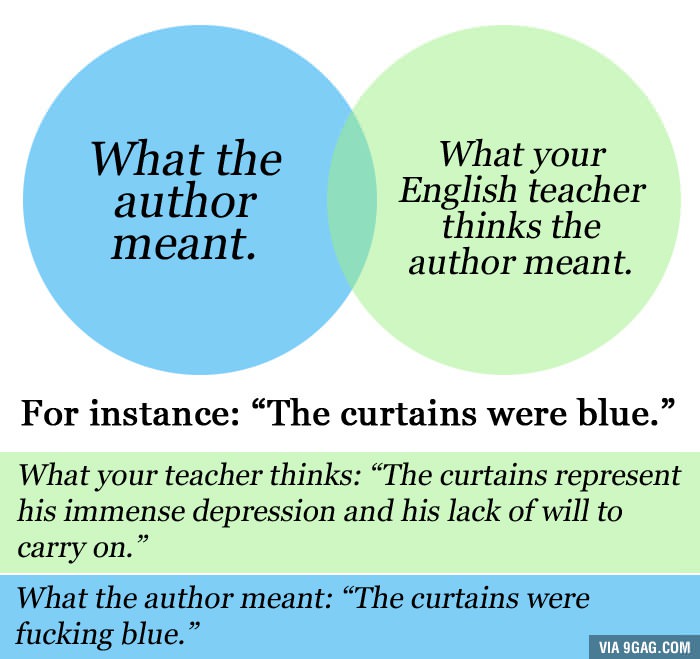
I can unashamedly, in fact proudly, announce that I write genre fiction. I love reading it, and I sure as hell love creating it.
It shouldn’t shock anyone since I’m also a big fan of blogging. I prefer sincerity, fun and wild imaginations over…well… literary.
I’m not saying English classes in high school where we got to dissect every piece of story and poetry we came across in our so-thick-that-it-probably-hurt-our-posture-to-carry-them-around literary books didn’t fill me with some great knowledge and perspective. It did.
Some were really good, though I suspect the authors I enjoyed and/or was in awe of probably fell more into genre fiction than literary fiction (more on the distinction that’s not always so clear).
But years of obligatory analyses also prevented me from studying literature any further in college. A lot of my friends were surprised. I was one of the best English students in class: impulsively enthusiastic, hard-working and with meaningful stuff to contribute. What they didn’t always recognize is that while I’m a fan of the language and storytelling, I just don’t like when authors care more about their words than story, character, pace and feeling.
Maybe it’s a higher calling. Maybe it’s a talent you are born with, or you can practice and learn as you try. I wouldn’t know. I simply don’t have it in me.
When you say literary fiction, I instinctively think about authors who can describe a tree for 10 pages and be loved for it. This might be narrow-minded on my part, but here’s the problem: I love life. And life is finite. Any story that makes me regret every second I spend on it, and makes seconds feel like hours, is just not worth the pain.
That said, some people can successfully combine genre fiction with literary fiction. So if Jane Austen is one of those authors, maybe there’s hope for me to enjoy more literary fiction. I’m saying, if, because the lines are blurry, and her work is so much fun.
Genre Fiction vs. Literary Fiction
What prompted this post was a short story contest’s instructions. One of their few rules was that they didn’t accept genre fiction of any kind, and it got me wondering on how the hell one could/would write a story without a genre. Let’s blame it on my movie (almost all genres except too gory horror) and genre fiction (particularly legal/crime thrillers and/or romantic comedies) reading addictions. Since I wasn’t sure I could define literary fiction accurately, I dug up. Here’s some useful and to-the-point stuff I found:
According to wikipedia: “Literary fiction is a term principally used for certain fictional works that are claimed to hold literary merit.
Despite the fact that all genres have works that are well written, those works are generally not considered literary fiction. To be considered literary, a work usually must be “critically acclaimed” and “serious”. In practice, works of literary fiction often are “complex, literate, multilayered novels that wrestle with universal dilemmas”.
Brandi Reissenweber says: “A genre is a category of literature, such as mystery, suspense, science fiction or horror. Each genre has its own conventions. Romance, for example, focuses on romantic love between two people and often ends positively. Generally, genre fiction tends to place value on entertainment and, as a result, it tends to be more popular with mass audiences.
Literary fiction, on the other hand, is a bit trickier to define. In general, it emphasizes meaning over entertainment. Literary fiction also aspires toward art. Of course, that abstract of “art” is where things get most tricky. What is art? In fiction it can be defined as interesting and deep manifestations of the elements of craft: dimensional characters, a pleasing arc of tension, evocative language and thematic purpose.”
And Leigh Galbreath writes: “Genre fiction is built on structure. Literary fiction isn’t.”
*
So while writing literary “insert genre fiction sub-category here” is possible, it is tough, and I wouldn’t even know where to begin.
If you have authors you love that combine the two without sacrificing fun and relatability, please suggest away in the comments. I’d love to discover them.
And what about you? Which one do you like reading? Which one do you like writing? Or do you read/write both?
Since I started trying to build a presence online this year as a writer, I have learned that pretty much anyone not in the “literary fiction” circle scoffs at the idea of it. I have been told on MANY occasions that it isn’t a “real” division of fiction at all (let’s be frank: most literary fiction classics were actually contemporary [genre] when they were written).
I’ve been told it’s really just a way publishers tout their clients’ books above others, but has no real merit. But I don’t know. If I really had to think about it, I think literary fiction (of the stuff I’ve read) is literary because of allusions. Works by the great authors, the classics, have a certain connection to OTHER authors, and OTHER writers. So I guess, like poetry, those that allude to other works of literature become literary to me…. but, that’s just me.
Nice post. 🙂
Hi Alex,
Thanks for commenting. I’m happy that you enjoyed the post.
I just found it was weird to eliminate genre fiction all together. There are thankfully enough markets and contests for genre fiction to get alarmed about one contest, but I did find it odd. Everyone is entitled to their preferences, but I loved how you put it: they were contemporary and a certain “genre” when they were written…:) It’s just important to follow your heart when you are writing and reading…